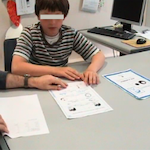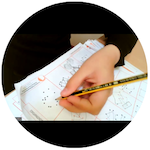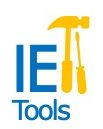What is Instrumental Enrichment (IE) training?
IE comprises two programmes, IE Standard and IE Basic. Each programme targets different groups, with some overlap in age and content. IE Standard instruments are hierarchical and taught in a specific order and IE Basic offers a flexible approach. The decision to teach IE Standard, IE Basic, or to combine elements from both, is made by skilled IE practioners based on the needs of individual learners or groups.
IE Basic

IE Basic is designed for children approximately five to eight years old. IE Basic consists of ten instruments that cover a wide range of developmental skills. Some of these underpin IE Standard and others address different applications of thinking and reasoning. IE Basic comprises two training courses, Part 1 and Part 2.
IE Standard

IE Standard is suitable for children of approximately ten years and above. It has no upper age limits and can be applied with the elderly and other important client groups as a mediational tool for addressing brain trauma, injury or cognitive decline. The programme consists of fourteen Instruments which are arranged hierarchically to reinforce efficient modes of thinking. IE Standard comprises three courses, Levels 1, 2 and 3. Each level builds on the previous one.
What is Instrumental Enrichment (IE) training?
IE comprises two programmes, IE Standard and IE Basic. Each programme targets different groups, with some overlap in age and content. IE Standard instruments are hierarchical and taught in a specific order and IE Basic offers a flexible approach. The decision to teach IE Standard, IE Basic, or to combine elements from both, is made by skilled IE practioners based on the needs of individual learners or groups.
IE Basic

IE Basic is designed for children approximately five to eight years old. IE Basic consists of ten instruments that cover a wide range of developmental skills. Some of these underpin IE Standard and others address different applications of thinking and reasoning. IE Basic comprises two training courses, Part 1 and Part 2.
IE Standard

IE Standard is suitable for children of approximately ten years and above. It has no upper age limits and can be applied with the elderly and other important client groups as a mediational tool for addressing brain trauma, injury or cognitive decline. The programme consists of fourteen Instruments which are arranged hierarchically to reinforce efficient modes of thinking. IE Standard comprises three courses, Levels 1, 2 and 3. Each level builds on the previous one.
2023-4 offering: IE Level 2
This IE Level 2 programme delivers training through a unique blend of pre-recorded videos, assignments and live online sessions. All training guidelines are set by the Feuerstein Institute. On completion of the programme, practitioners receive the internationally accredited Feuerstein Institute certificate.
Who should consider IE Level 2 training?
IE Level 2 training is for teachers, psychologists and others who have completed IE Level 1 training and are working with either typical or developmentally challenged children and adults. An essential component of the programme is teaching students to develop links from learning to everyday situations, bridging effectively from theory to to meeting daily needs. Students are helped to generate new information, make decisions, organise, plan and anticipate future events, develop language, logical reasoning and empathy, and find solutions for a range of academic and social problems.
What are IE Level 2 learning objectives?
Build on IE programme concepts covered in IE Level 1, strengthening your confidence as a mediator
Learn the cognitive skills of Task Analysis, Bridging, and Generalising, building on the four foundational Instruments of IE
Discover how to teach the programme’s five intermediate instruments: Illustration, Categorisation, Temporal Relations, Family Relations, and Instructions
Use IE with older students to strengthen curricular learning, social relationships, and effectiveness in daily life activities
Exploit IE materials to grow social awareness and communication skills in others
Understand course support and advice resources to build skills further after training
2023-4 offering: IE Level 2
This IE Level 2 programme delivers training through a unique blend of pre-recorded videos, assignments and live online sessions. All training guidelines are set by the Feuerstein Institute. On completion of the programme, practitioners receive the internationally accredited Feuerstein Institute certificate.
Who should consider IE Level 2 training?
IE Level 2 training is for teachers, psychologists and others who have completed IE Level 1 training and are working with either typical or developmentally challenged children and adults. An essential component of the programme is teaching students to develop links from learning to everyday situations, bridging effectively from theory to to meeting daily needs. Students are helped to generate new information, make decisions, organise, plan and anticipate future events, develop language, logical reasoning and empathy, and find solutions for a range of academic and social problems.
What are IE Level 2 learning objectives?
Build on IE programme concepts covered in IE Level 1, strengthening your confidence as a mediator
Learn the cognitive skills of Task Analysis, Bridging, and Generalising, building on the four foundational Instruments of IE
Discover how to teach the programme’s five intermediate instruments: Illustration, Categorisation, Temporal Relations, Family Relations, and Instructions
Use IE with older students to strengthen curricular learning, social relationships, and effectiveness in daily life activities
Exploit IE materials to grow social awareness and communication skills in others
Understand course support and advice resources to build skills further after training
